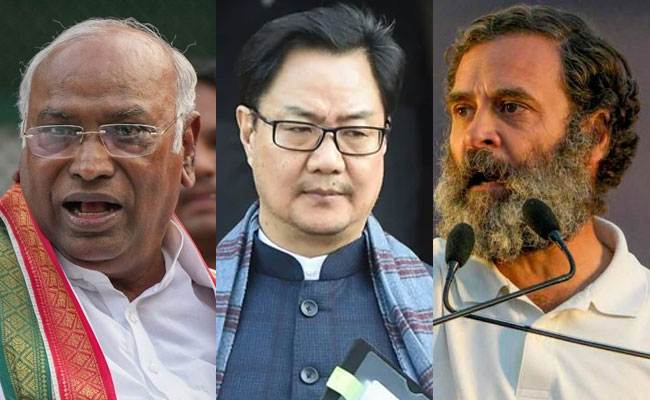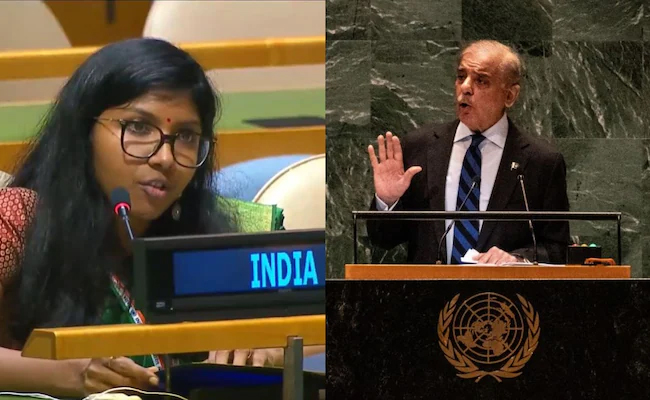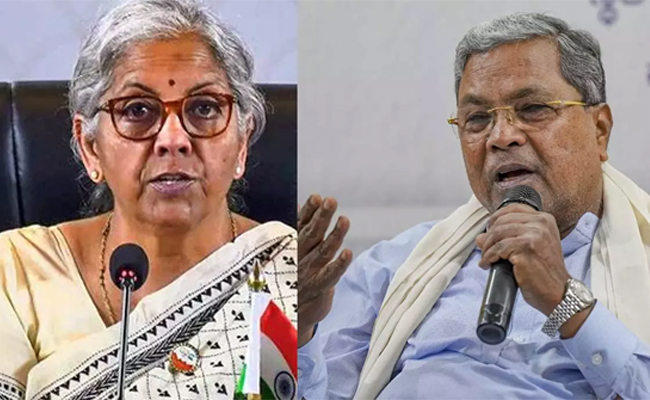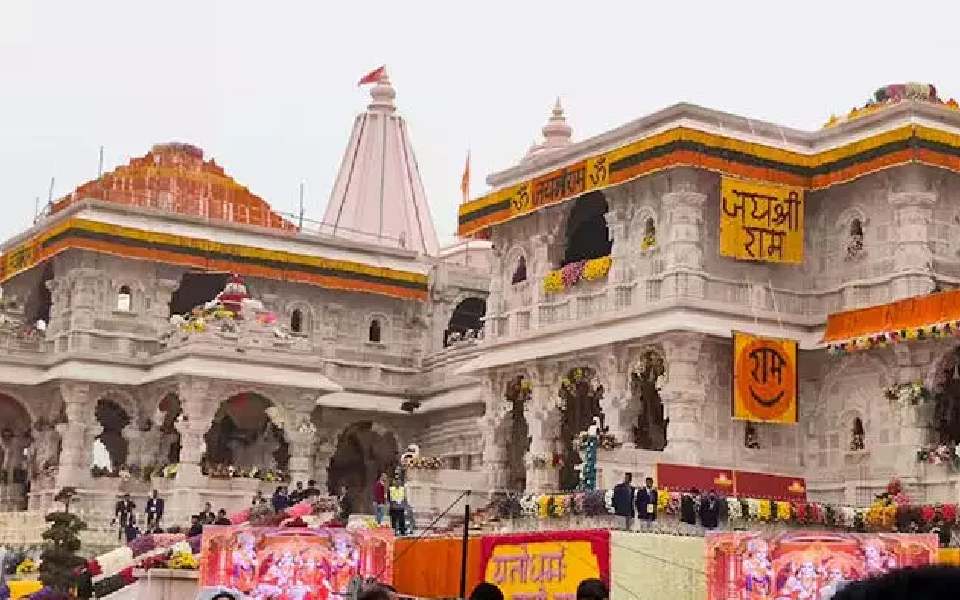New Delhi (PTI): Law Minister Kiren Rijiju alleged on Monday that the decision of Congress leaders to accompany Rahul Gandhi to a Surat court, where he will file an appeal against his conviction in a criminal defamation case, was a way of trying to exert "undue pressure" on the judiciary, a charge rejected by party chief Mallikarjun Kharge, who said it was a symbol of support and not a show of strength.
Gandhi will be in Gujarat's Surat city on Monday to file the appeal in a court against his conviction in the 2019 criminal defamation case over his "Modi surname" remarks.
Senior Congress leaders, including Priyanka Gandhi Vadra, the chief ministers of three party-ruled states, other national and state leaders are likely to accompany him to the court, sources said.
Gandhi's lawyers said the matter is likely to be taken up for hearing by the sessions court on Monday itself.
"My point is very simple -- why the Congress party is trying to put this kind of undue pressure on the judiciary? There are means and ways to deal with judicial matters. But is this the way?" Rijiju asked while talking to reporters in the Parliament House complex here.
He wondered whether there has ever been a case in the past where an entire political party tried to "gherao" a court.
"When former prime minister P V Narasimha Rao was convicted Congress was quiet. P Chidambaram and D K Shivakumar didn't get support against charges for which they are out on bail," the law minister wrote on Twitter.
Only for Rahul Gandhi, the Congress is staging this "drama" as it considers a family and a person above the country and its laws, he added.
Kharge said the decision taken by the party leaders to accompany Gandhi to the court was personal. "Even in a small case, family members join and go to court. Here, it is about an entire party and he (Gandhi) is fighting for the country," the Congress chief told reporters here.
He said the presence of the party leaders in Surat is not a "show of strength", but a "symbol of support" for Gandhi.
Congress general secretary Jairam Ramesh took to Twitter to hit back at Rijiju, saying, "The man who threatens the judiciary, judges and ex-judges daily and also distorts history daily talking. Hypocrisy ki koi seema nahin hai Modi Kaal mein (There is no limit to hypocracy in Modi's rule)."
Rijiju said when the Enforcement Directorate (ED) takes action, Congress leaders want to gherao the agency's office. "When the CBI takes action, they want to gherao the CBI. When a court gives a verdict, they want to take over the court complexes. These kind of activities demean democracy and every Indian must condemn it," he told reporters.
Dubbing the Congress leaders' move to accompany the former party chief to court as "sycophancy of one family", the minister wondered whether the family was above the country.
He said Gandhi might be going to Surat to file an appeal, but it is not required of a convict to go personally to do it.
"Generally, no convict goes personally. His going personally with a motley group of leaders and aides accompanying him is only a drama. What Rahul Gandhi is doing is also a childish attempt to bring pressure on the appellate court. All courts in the country are immune from such tactics," the minister wrote on Twitter.
#WATCH | They (Congress) are doing a drama to threaten the judiciary. I condemn it. If a court has convicted somebody, then the drama is basically about pressuring. Congress party considers a family above the country...: Union Law Minister Kiren Rijiju pic.twitter.com/o4odhezV8L
— ANI (@ANI) April 3, 2023
Let the Truth be known. If you read VB and like VB, please be a VB Supporter and Help us deliver the Truth to one and all.
United Nations (PTI): In a strong retort, India has slammed Pakistan in the UN General Assembly, saying its “fingerprints" are on terrorist incidents across the world and the country should realise that cross-border terrorism against India will “inevitably invite consequences”.
India exercised its Right of Reply in the UN General Assembly on Friday in response to Pakistan Prime Minister Shehbaz Sharif raising the issue of Jammu and Kashmir in his address at the General Debate of the 79th session of the UN General Assembly.
“This Assembly regrettably witnessed a travesty this morning. A country run by the military, with a global reputation for terrorism, narcotics trade and transnational crime has had the audacity to attack the world's largest democracy,” First Secretary in India’s Permanent Mission to the UN Bhavika Mangalanandan said, delivering India’s Right of Reply.
She asserted that as the world knows, Pakistan has long employed cross-border terrorism as a weapon against its neighbours.
“It has attacked our Parliament, our financial capital Mumbai, marketplaces and pilgrimage routes,” she said, referring to the 2001 Indian Parliament attack and the 26/11 Mumbai terror attacks carried out by Pakistan-based terror groups.
“The list is long. For such a country to speak about violence anywhere is hypocrisy at its worst,” Mangalanandan said.
In his address, Sharif raised the Kashmir issue, as expected, and said that to “secure durable peace”, India should reverse the Abrogation of Article 370 and enter into a dialogue for a “peaceful” resolution of the issue.
He said India has spurned Pakistan’s proposals for a mutual “Strategic Restraint Regime”.
Responding to this reference “to some proposal of strategic restraint”, India asserted that there "can be no compact with terrorism. In fact, Pakistan should realise that cross-border terrorism against India will inevitably invite consequences.”
Reminding the international community that this was a nation that for long hosted Al Qaeda leader Osama bin Laden, Mangalanandan said Pakistan’s “fingerprints are on so many terrorist incidents across the world, whose policies attract the dreads of many societies to make it their home.
“Perhaps it should come as no surprise that its prime minister would so speak in this hallowed hall. Yet we must make clear how unacceptable his words are to all of us. We know that Pakistan will seek to counter the truth with more lies. Repetition will change nothing. Our stand is clear and needs no reiteration,” she said.
India stressed that it is even more extraordinary for a country with a history of rigged elections to talk about political choices, that too in a democracy.
“The real truth is that Pakistan covets our territory, and in fact, has continuously used terrorism to disrupt elections in Jammu and Kashmir, an inalienable and integral part of India,” the young Indian diplomat said.
She said it is ridiculous that a nation that committed genocide in 1971 and which persecutes its minorities relentlessly even now, “dare speak about intolerances and phobias. The world can see for itself what Pakistan really is.”
A Pakistani diplomat went on to respond to Mangalanandan with a Right of Reply.
Describing India's assertions as "baseless and misleading", the Pakistani diplomat said the United Nations Security Council, through numerous resolutions, has unequivocally called for a free, impartial plebiscite to enable the people of Jammu and Kashmir to exercise their inalienable right to self- determination.
Every year, Pakistan’s leaders, on expected lines, make references to Jammu and Kashmir in their UNGA speeches and India fields its young diplomats to deliver hard-hitting retorts to Islamabad’s rants.





